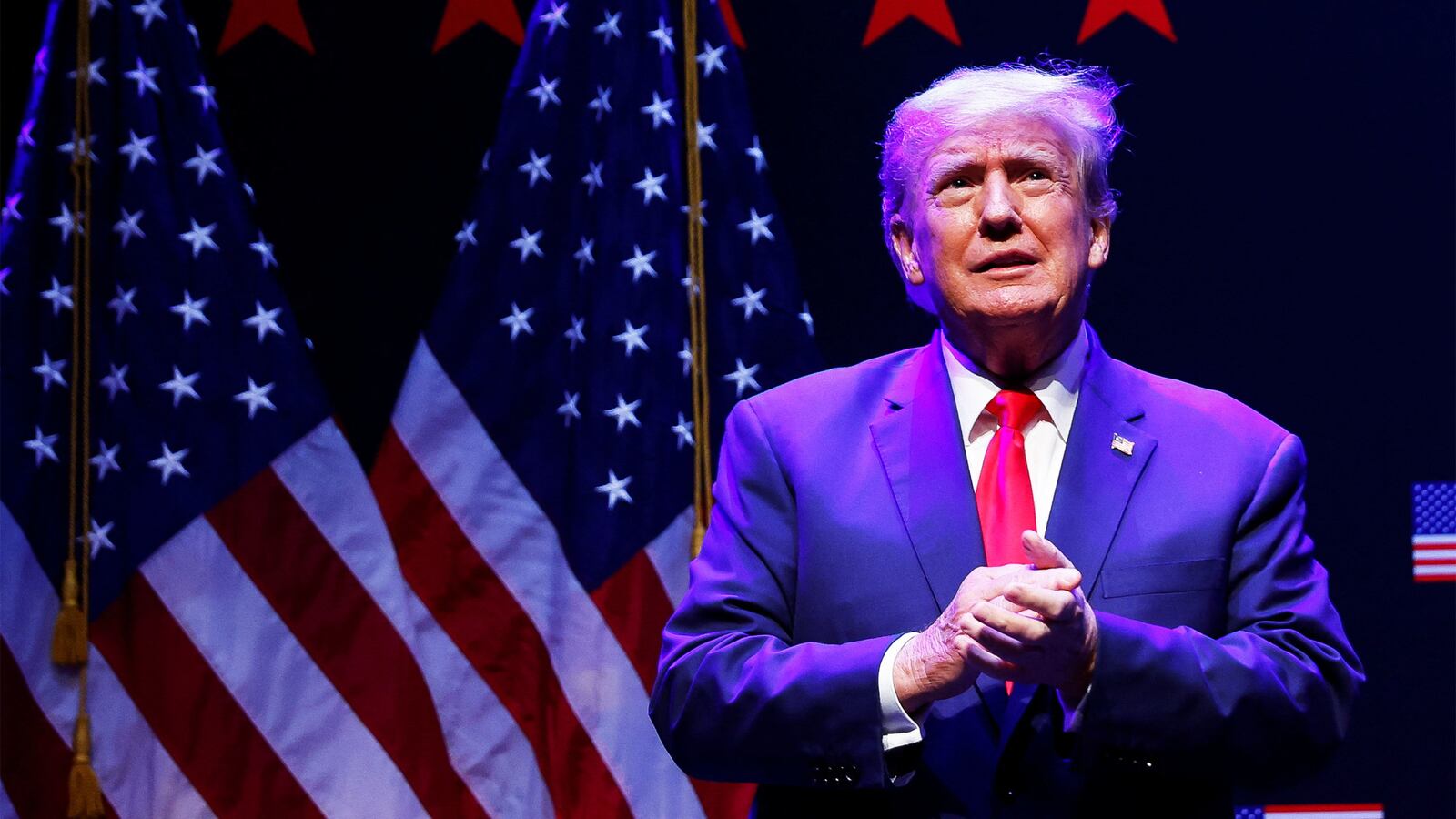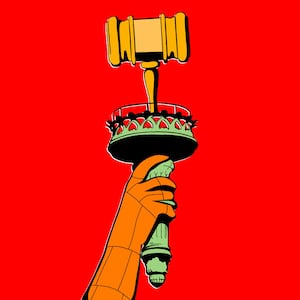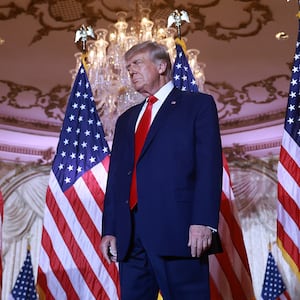Former President Donald Trump’s decision to forgo testifying before a New York grand jury likely wasn’t a tough call, but the timing indicates an indictment could be just weeks away, maybe even days, according to former prosecutors.
“It tells me they’re at the 1 yard line. It's one of the last things you do, after all the evidence has gone in,” said Karen Friedman Agnifilo, who served as the chief assistant to Cyrus Vance Jr., the previous district attorney who started the investigation.
“I wouldn’t want to give too much notice. I wouldn’t want him to intimidate my witnesses… and he’s such a bully. He engages in bullying and witness tampering,” she said.
The timing of the invitation means jurors have likely heard much of what prosecutors know about the way Trump orchestrated a hush-money scheme to keep the world from knowing about his illicit sexual affair with the porn star Stormy Daniels—which spared his 2016 presidential campaign potentially devastating embarrassment.
The Manhattan District Attorney’s Office, now led by Alvin Bragg Jr., last week offered Trump the chance to explain himself to the grand jury. But the deal notably came with strings attached, said one of his defense lawyers, Joe Tacopina; Trump could only talk to the grand jury if he first waived immunity for anything he says.
That isn’t particularly notable. Such offers are standard procedure in New York—but only for the top target of a criminal investigation. New York law mandates that anyone speaking to a grand jury automatically gets total immunity for any crime they discuss in that private setting. But that special deal is never extended to the main target of a criminal probe. What’s actually notable is that the grand jury is at a stage where Trump has been asked to testify.
It indicates that indictments could be right around the corner.
Talking to the grand jury would have been a massive gamble—one that few people ever take—but it’s one of those offers that occasionally delivers surprise results upending criminal cases, according to six former Manhattan prosecutors with extensive experience presenting before grand juries.
“In a case where there may be doubt, it is the defendant’s best chance either to have the jury return a ‘no true bill,’ or they may indict on a lesser charge,” said Georges G. Lederman, a former Manhattan prosecutor who worked fraud cases at the same division that is now pursuing the case against Trump.
But that only works “on a case where the evidence is not overwhelming,” Lederman said.
For years, the American public has heard about how Trump scrambled in the final weeks of his 2016 campaign to conduct a “catch-and-kill” operation—teaming up with the National Enquirer to have the tabloid buy Stormy Daniels’ tell-all story and keep the sexy story from ever seeing the light of day.
But Trump was already in the White House and in a position to exert influence over the Justice Department by the time federal prosecutors discovered that Trump had directed his fixer, Michael Cohen, to kill the story with the help of the magazine company’s CEO, David Pecker.
Cohen ultimately took the fall for those actions, and the Manhattan DA’s Office spent years reviving the investigation.
With a mountain of paper evidence and everyone now talking, the Manhattan DA seems to finally have a fully built-out case. And it’s not the kind of situation that lends itself to having Trump try to convince grand jurors that there’s some kind of misunderstanding, four former prosecutors told The Daily Beast.
“There are instances—although not in a ‘paper case’—where defendants have chosen to tell their side of a story and the grand jury has not voted to indict. It’s not common, but it’s not impossible. And in certain kinds of cases, that could be more successful—if you’ve got two sides to a story,” said Margaret J. Finerty, a former prosecutor who later spent three years as a criminal court judge.
Ex-prosecutors said the people who ultimately decide to cast their fate before a grand jury tend to be accused of a crime involving self-defense or alleged sexual assault, brief situations involving few people where the facts largely come down to a person’s point of view.
By contrast, Manhattan prosecutors are exploring a case accusing Trump of a slow and deliberate effort to deceive the public and the feds. After all, it took Trump more than a year to pay back Cohen—11 installments totalling $420,000, payments that were routed through the Trump Organization to conceal them.
As University of California-Irvine law school professor Richard L. Hasen previously told The Daily Beast, Trump could be found guilty of violating campaign finance laws for coordinating with Cohen, and his company could be on the hook for making an illegal corporate contribution to a campaign for cutting the checks.
The damning details would put Trump in a difficult position were he to testify before the grand jury, former prosecutors said.
“You’re waiving immunity. If you lie, you’re now subjected to a perjury count. You’re now telling the prosecutor your whole defense. And they now have a transcript of your testimony they can use against you,” said Catherine A. Christian, who oversaw financial fraud investigations as a Manhattan assistant district attorney until last year.
If Trump decided to talk to the grand jury, he would be ushered into the DA’s building in Lower Manhattan, where prosecutors secretly meet with the group on the ninth floor. Although the room itself is run by the local court system, it doesn’t exactly resemble a courtroom. Christian likens it to a well-lit college lecture hall, where roughly 23 grand jurors sit in the audience with a prosecutor while a witness answers questions from a desk facing the crowd. Defense lawyers can sit nearby but aren’t allowed to interject, and grand jurors can ask the target of the investigation whatever they want.
While a person still retains their Fifth Amendment right against self-incrimination, jurors will look at any refusal to answer a question with deep suspicion.
“They are posing questions—probably tough questions—that you then must answer. Grand jurors are judging your credibility,” said Finerty, the former judge.
Although the generally accepted legal strategy is to never put a person in that hot seat, some brave defense attorneys who believe in their client’s innocence welcome the challenge.
“I put four of my clients and got four ‘no true bills,” Christian said. “If they have a decent chance of getting off, I would put him or her before the grand jury.”
Trump’s decision not to testify indicates that his team considers the current case a risk and would rather duke it out at an eventual trial, these prosecutors said.
“He has everything to gain now if he thinks he can convince a grand jury not to indict him. But he also has everything to lose,” Agnifilo said, noting that the gamble only works “when you have a very sympathetic and pretty provable story.”









